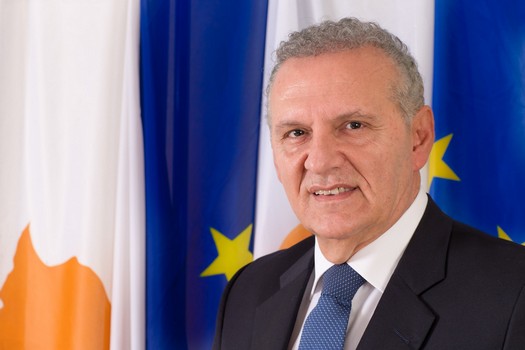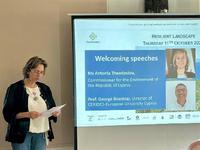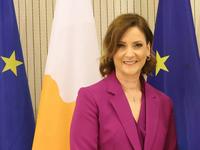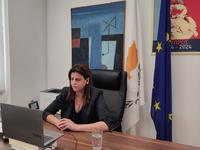Press Releases

16-10-2019 16:29
Address by the Presidential Commissioner, Mr Photis Photiou, at the conference: “Peace Building in Cyprus”
First, I would like to extend a warm welcome to the members of foreign delegations, especially to the Most Reverend Archbishop of Milan, H.E. Mario Enrico Delpini, as well as to each and every attendee of this meeting, and of course to my dear friend, the Maronite Archbishop of Cyprus, H.E. Youssef Soueif whom I sincerely thank for the high level of our cooperation over the years, and for today's hospitality.
The topic of our meeting is a very important one. And always high on our agenda. "Building for Peace in Cyprus". It is, I would say, a story of many tortuous years. Unfortunately, we are in a region of great interests and claims. That is why I can safely state that peace in Cyprus is not an issue that solely concerns the two communities of our island, the Greek Cypriots and the Turkish Cypriots. Finding a solution to the Cyprus problem is a matter of respect for the decisions and resolutions of the United Nations and the international law in its entirety, especially by Turkey which is flagrantly breaking its provisions with the continued occupation of 37.5% of our territories and its provocative and illegal actions in our territorial waters and our Exclusive Economic Zone.
Indeed, I would say that over the last few years the behaviour of the occupying forces has deteriorated, in the light of parallel efforts to islamize the occupied territories and permanently change their character.
In Cyprus, the 1974 Turkish invasion and the continuing occupation has caused a massive destruction to the cultural and religious heritage of the island.
According to the records, it is estimated that more than 20,000 religious icons have been stolen and more than 550 churches and their cemeteries have been looted. Moreover, it is known that many churches are currently used as mosques, stables, military bases, workshops, warehouses, parking lots, hotels, nightclubs, etc.
Apart from the religious monuments, archaeological sites have also been completely destroyed, while others remain unprotected, neglected and easy prey for looters.
The Turkish invasion created also another big humanitarian tragedy. Besides the dead, nearly 1600 Greek Cypriots were reported to the ICRC by their families as missing. Ever since, the Government of Cyprus, despite the difficulties and the obstacles did everything possible to secure information about the fate of the missing persons for the sake of the families. The Government of Cyprus considers and always considered the tragedy of the missing persons as a humanitarian problem and treated it as such.
Unfortunately, so far, Turkey has not taken the political and humanitarian steps that are needed for the solution of this humanitarian problem. It should be emphasized that without the sincere cooperation and help of Turkey the tragedy of the missing persons cannot be solved.
But, whatever the difficulties and problems we are called upon to face, our effort focuses on our willingness to work with the UN Secretary-General to bring an end to the division of Cyprus and to find a viable and lasting solution to the Cyprus problem on the basis of international law and the principles and the acquis of the European Union, free from foreign dependencies, foreign troops and rights of intervention by third countries.
Status quo is not an option. We have to end this unacceptable status quo with a state which will ensure common and prosperous future for the coming generations of Greek and Turkish Cypriots, Maronites, Armenians and Latins. What should prevail on our island is peace and freedom, while ensuring safety, stability and peaceful coexistence collaboration and achieving prosperity for all citizens, in an ordinary country.
In order for negotiations to resume, however, Turkey must first cease all illegal and provocative activities within the Exclusive Economic Zone of the Republic of Cyprus, which are in flagrant breach of international and European law and the sovereign rights of the Republic.
Multiculturalism has been part of the identity of Cyprus for many years. But it has also been its power. Hence the implementation of programmes and plans to respect and manage diversity, as well as to fight against discrimination. Moreover, peaceful coexistence and good cooperation with citizens from other countries and with people of different religions and customs, have shown that Cyprus can indeed be a powerful example for other regions of the world.
Our always excellent relations with the religious groups of the Maronites, the Armenians and the Latins of Cyprus have historically been founded on common principles and values. According to the Constitution of the Republic of Cyprus, they are an equal and integral part of the society of Cyprus.
By a referendum held on 14 November 1960, the Maronites, the Armenians and the Latins of Cyprus collectively chose to belong to the Greek Cypriot community and have since been regarded as its members.
The said legislation stipulates that the elected representatives of the three religious groups henceforth participate in the House of Representatives with an advisory role, and with the right to vote on religious and educational matters affecting their group, which were previously under the jurisdiction of the Greek Community Assembly.
Undeniably, all members of the religious groups are also entitled to vote for the members of the House of Representatives related to the political parties of Cyprus and also in presidential elections.
The State's sensitivity and support towards the religious groups to enjoy equal treatment with the rest of the population at all levels, is also confirmed by the delegation to myself of the responsibilities related to most issues of the religious groups aiming to create a useful and always beneficial communication channel with the Presidency of the Republic.
With a defined strategy at hand to effectively achieve goals, we promote specific actions and initiatives to showcase and promote the religion, history and culture of each religious group.
In collaboration with Ministries, Services and educational institutions (universities, schools), and in consultation with the representatives of the religious groups, where relevant, we hold meetings and carry out concerted actions to better support and promote requests but also resolve issues of their concern.
To conclude, I would like to stress our strong conviction that, together with the members of the Maronite, the Armenian and the Latin religious groups, we do suffer the same way from the continued occupation of a large part of our homeland, and we do feel that a solution to the national problem would give a different great potential to our country and to all its legal residents, Greek Cypriots, Turkish Cypriots, Maronites, Armenians and Latins.
I would also like to underscore our deep appreciation for the great contribution of our religious groups to the economic progress and improvement of the living standards of our people.
Allow me to warmly thank you, once again, for the opportunity of this new communication between us and express my sincere hope to fully attain this meeting's objectives.
(EK/II)
Relevant Press Releases







